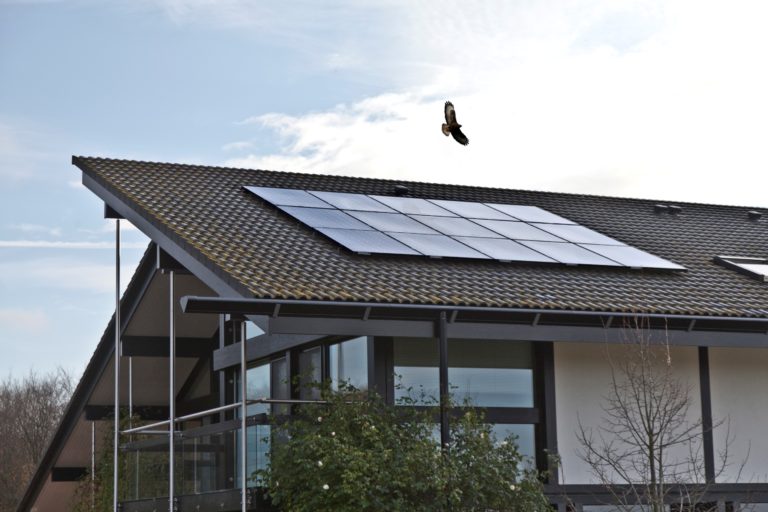Solar PV FAQ's
Questions we frequently get asked by our customers about solar PV:-

What is Solar Photovoltaics?
Basically, panels which collect daylight are mounted onto the roof, or in another suitable location, and generate DC electricity which is converted into AC electricity via an inverter. This AC electricity can then be used in your home. ‘Photovoltaics’ (PV) means converting light into electricity.
Do solar panels need direct sunlight to work?
The more direct sunlight that the panels receive the better, but they will still produce electricity in most daylight conditions. Any shading from nearby trees will affect the amount of electricity produced so you may need to consider keeping them trimmed.
How do I use the solar electricity?
Whenever an appliance is switched on the inverter will try to use solar electricity first if there is enough available. If there is not enough solar electricity available the inverter will switch to using mains electricity instead. The inverter automatically switches between solar and mains electricity as needed and you won’t notice any difference.
What happens if I don’t use all the solar electricity produced?
If your system produces more solar electricity than you need this is usually feed back into the national grid. This is called “Export”. Occasionally the grid operators will limit the amount of electricity that they can accept, in this case your inverter will be programmed to check to see if you need any electricity and if you don’t it will switch the system off so that the national grid isn’t overloaded.
Solar electricity needs to be used as soon as it is produced, exported to the grid or stored in a Battery Storage System.
Can I sell my excess solar electricity?
In January 2020 the Government set up the Smart Export Guarantee (SEG) to replace the old Feed-In Tariff. If you have a Solar PV system, a smart meter and are not already receiving the Feed-In Tariff then you can sign up to the SEG with any electricity supplier that has more than 150,000 customers (it doesn’t have to be your current supplier). The rate you will be paid varied between suppliers so it’s worth shopping around to find the best deal.
Will solar panels power my whole house?
No, solar electricity only contributes towards your requirement and the panels don’t produce any electricity at night. It is unlikely that a standard system will produce enough electricity to cover all of your electricity needs.
Will I save money?
Yes, by creating some of your own electricity you will use less electricity from the national grid and therefore you should save money on your electricity bill. How much you can save depends on factors such as the size of the system you have and installed and the current utility rates.
You can maximise your solar electricity usage but running certain appliances (washing machine, dishwasher, etc.) only during the daytime and in sequence.
How do I know if my system is working?
Similar to your mains electricity your Solar PV system will have its own generation meter installed which measures every unit (kWh) of electricity your Solar PV system produces. The generation meter reading will increase over time showing the total produced since the system was installed. If you think that the amount of electricity being produced has decreased contact your installer. Bear in mind the system will perform better in summer than in winter when there is less daylight.
What maintenance is involved?
Solar PV systems require very little maintenance as there are no moving parts to wear out. The panels are designed to be self-cleaning although depending on your location they may overtime build up a layer of dirt from leaves, bird droppings or salt water. If this is the case you may periodically want to get a professional to come and clean the panels will soapy water. We don’t recommend doing this yourself as there is always a risk of working at height but your local window cleaner may offer this service.
What happens if there is a power-cut?
During a power cut your inverter will shut the Solar PV system down to stop any electricity being exported to the national grid and protect any engineers who may be working on the mains. So during a power cut you won’t be able to use any solar generated electricity. Once the mains power comes back on the inverter will detect this and automatically switch the Solar PV system back on.
Will I get a Guarantee/Warranty?
You will receive a standard 2 year workmanship warranty, and guarantees from the manufacturers of the panels, inverter and generation meter.
What if I want to sell my house?
Most potential buyers see a Solar PV system as a positive feature as it will contribute to lower energy bills compared to a house without solar. Keep the user manual and MCS certificate as these may be required for the new owners.
What is an MCS Certificate?
An MCS (Microgeneration Certification Scheme) Certificate is proof that your installation has been designed, installed and commissioned to the highest standard using only certified products and by an accredited installer.
MCS is a standards organisation; they create and maintain standards that allow for the certification of products, installers and their installations. MCS certified Installers have undergone a rigorous vetting process to demonstrate that they adhere to the standards.
